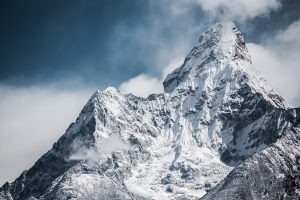Nepal’s government announced Friday that it was suspending climbing permits for Mount Everest and all of the other peaks in the country due to concern over the spread of the coronavirus.
The decision effectively shuts down the world’s tallest mountain since China already closed its side of Everest over similar fears. Everest straddles the border between Nepal and China and can be climbed from both sides.
Shutting down the popular spring climbing season across the country was a precautionary measure to block any possibility of the spread of the virus, said Surendra Thapa, an official with Nepal’s Department of Tourism, which issues climbing permits.
The government also said it was canceling all visas on arrival for tourists and that those arriving after Saturday would be subject to 14 days of self-quarantine. Visitors will also no longer be able enter through land borders and must travel through the only international airport, which is situated in the capital, Kathmandu.
Nepal has eight of the highest peaks in the world and the adventurers who head to the country to climb them are a significant source of revenue for the government and the thousands of workers who support the expeditions. So are trekkers and other tourists who flock to the Himalayan nation.
Even before the closure, expedition operators in Nepal had said cancellations for the spring climbing season had been pouring in.
There had been concerns about the new virus and how it could spread among climbers living for weeks on the mountains in shared tents in extreme temperatures. Fever, coughs and colds are already common among climbers.
For most people, the new coronavirus causes only mild or moderate symptoms, such as fever and cough. Some, especially older adults and those with existing health problems, develop more severe illnesses such as pneumonia.
The vast majority of people recover from the new virus. According to the World Health Organization, people with mild illness recover in about two weeks, while those with more severe illness may take three to six weeks to recover.
Nepal so far has had one confirmed case of the virus. The Nepali student who returned home for a holiday from China has already recovered.
Schools in the country have been ordered to wrap up the academic year by next week and close down, while citizens have been advised to stay away from crowded gatherings and avoid unnecessary travel.
By Binaj Gurubacharya for the Associated Press.

































